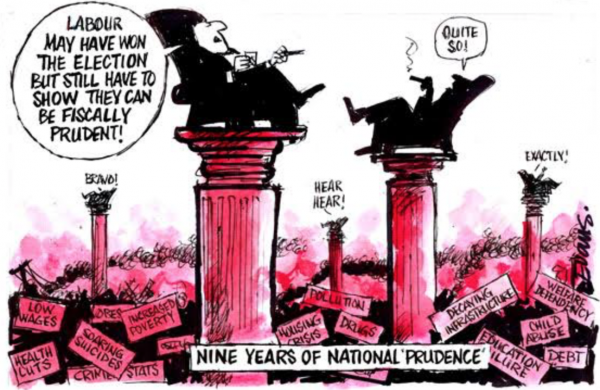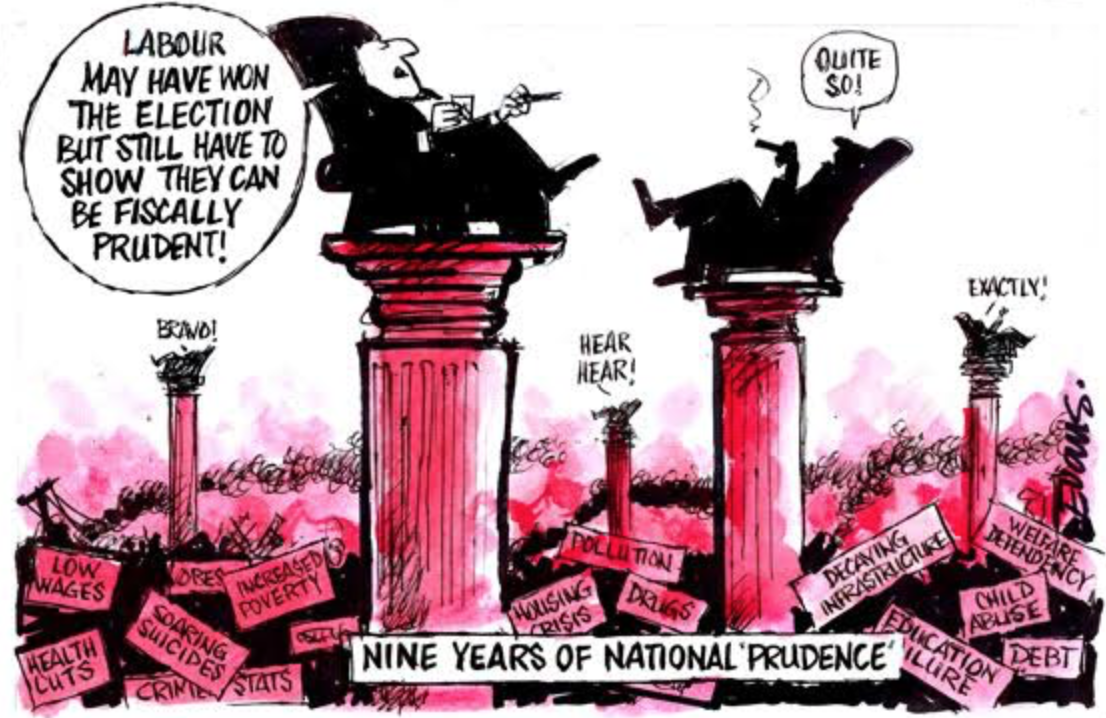
It was sad reading Stephen Hickson’s defence of capitalism in the Press (25 October 2017). Sad because capitalism has delivered so much outright misery to so much of humanity over the last 300 years that it’s hard to believe anyone could be so blinkered.
Capitalism was never intended to meet human needs. It was developed and maintained by the wealthy and powerful, and supervised by their political representatives, to make profits. Small wonder then that capitalism creates a vast quagmire of problems in its wake – no more so than in New Zealand.
Capitalist market failure is everywhere.
Desperate housing shortages, poverty incomes, environmental destruction, sky-high electricity prices, mental health service breakdown, child poverty – you name it – markets have failed us across the board.
When 41,000 people are living in overcrowded homes; cars and vans; cockroach infested caravans and under bridges then the housing market has failed. Left to itself, capitalism will only ever provide a cardboard shack for a family on a low income.
On a global scale we see the same pattern. Planet earth produces enough grain each year to comfortably feed the entire human population but through the capitalist drive for profit, half that grain is used to feed animals to provide meat for middle class appetites while tens of millions of our fellow human beings starve.
Likewise the big American drug companies who claim they need to charge exorbitant amounts for new drugs because of the huge cost in developing them, spend much more money on advertising than they do on research and development.
To some extent it is a failure of governments to intervene in markets which exacerbates the negative impacts of capitalism, as Hickson suggests, but the last 30 years of unfettered capitalism has shown us its true nature.
Working people’s share of our national income has gone down dramatically while the share of income going to profits has increased. In other words, those who do the work to produce the wealth are getting less while those who live off wealth produced by others have had big increases in unearned income.
Deep in the belly of the capitalist beast, the US, there are 45 million Americans (15% of the population) living below the poverty line while in New Zealand we have one in four of our children living similarly in what once was called “God’s own country”.
Hickson is right to suggest taxes and regulations can help ease the worst problems with capitalism but this is like putting band aids on a cancer.
Hickson gives the example of the top 11% of income earners paying 48% of total income tax while the poorest 49% pay only nine percent of income tax.
However, no single figure on tax could be more misleading. Hickson ignores GST and the fact little or no tax is paid on the unearned income of the wealthy via such windfalls as capital gains, dividends or inheritance.
The poorest 10% of earners pay 14% of their incomes (after housing costs) on GST while the top 10% pay less than 5% of their income on GST. It is a tax that falls heaviest on those on the lowest incomes.
When one takes GST into account as well as income tax, a worker on the minimum wage pays around 26% of their income in tax while the Prime Minister will pay about 35% of her income in tax.
For someone on the rich list the figure will be less than 5%.
According to IRD, half the wealthiest 150 New Zealanders declare incomes of less than $70,000 for tax purposes. The rest of their massive income is for the most part untaxed. In reporting on the 2017 rich list earlier this year, NBR Editor Duncan Bridgeman said
“I think it’s continued boom times for the rich, the rich get richer and the rich are having a really successful period at the moment.”
According to Bridgeman New Zealand’s super wealthy increased their wealth by $7 billion over the past year to a total of $80 billion.
Think about that for a moment. This wealth is not created from thin air. It is made from manipulating the wealth created by working people. In other words, you and I and every person living in New Zealand has provided $1,500 more this past year so these 150 people could build a bigger pile of unearned income. And they pay next to no tax on it.
So why does a worker on the minimum wage pay a much higher tax rate than a rich lister?
Because rich listers have far greater political influence than the rest of us.
Capitalism is not the force for good its advocates claim. At heart it’s a mechanism for the few to amass wealth at the expense of the many.
Human beings are social beings. We are more naturally co-operative than competitive but capitalism is based on the reverse. The alternative is socialism (not the totalitarian state capitalism of the old USSR or China – misnamed as socialist or communist) whereby we co-operate together to ensure everyone has the ability to live lives of dignity and self-respect. That’s where our best future lies.
In the meantime the new government says it intends to set up a working group on taxation to come up with a fairer system. It’s long overdue but I’m not holding my breath. We will know from the outset by the makeup of the working group and its terms of reference whether the government is serious about reducing poverty and inequality and giving everyone a fair go.
Until then unfettered capitalism will continue to do its dirtiest work.
This article published in Christchurch Press on 8 November






Damn right John Your information here is staggering.
Thank you John for an excellent summary of the counter-arguments we all need to have ready when assailed by MSM spin and right-wingers in general.
Jacinda will fix it, John, have you not heard the praises?
Capitalism is all about making the mechanism. Unfortunately the last thing the universe is about is mechanism. Generally when you do the opposite of what you’re supposed to, certain things happen as a matter of course, eventually.
John i agree totally with your analysis.
But the power of the system is unmistakable as is the wealth that is generated to benefit the few.
We have yet to see a massive correction that will change the current narrative and move the balance in favour of working people and their aspirations such is the level of control we see in in all areas of our financial and daily lives.
It will take a massive effort to change it and it has powerful friends and supporters intent on keeping the status quo very much alive.
The many have the power to act but it needs a leader and a plan and that capitalist evil we all know and many love…..MONEY.
So much pain and pleasure, the last ‘300 years’. I know the pain but recognize the pleasure. Of course it’s short term. I have to say for the first world the pleasure was foremost in the end. I have nothing against the generation of our momentary wealth.
Comments are closed.